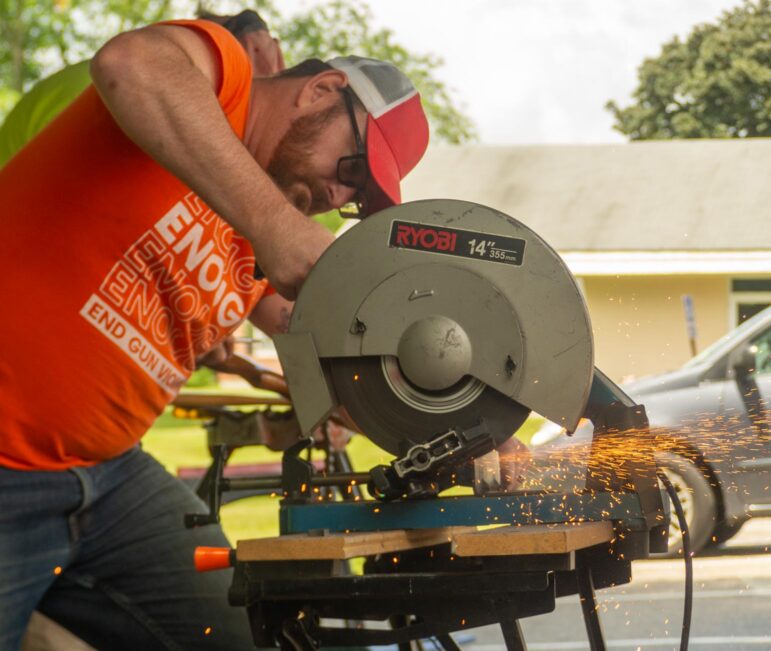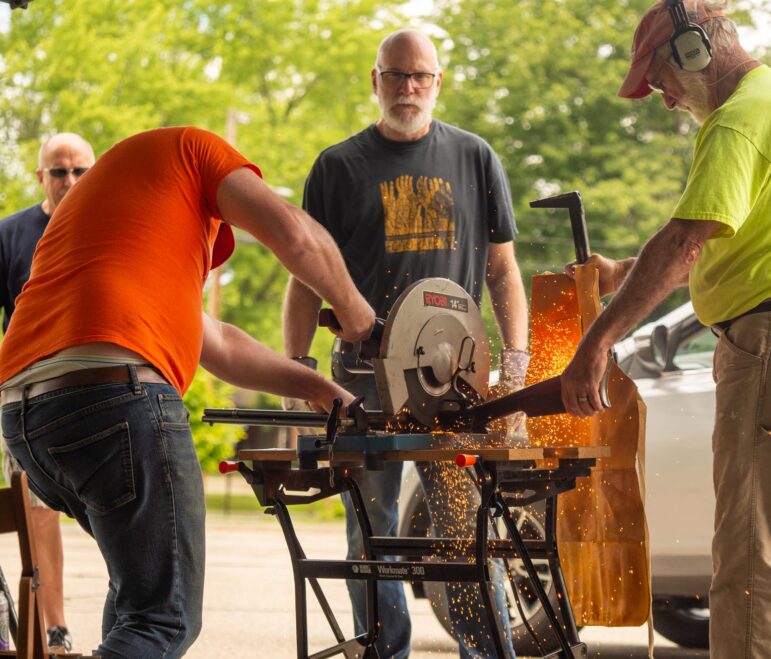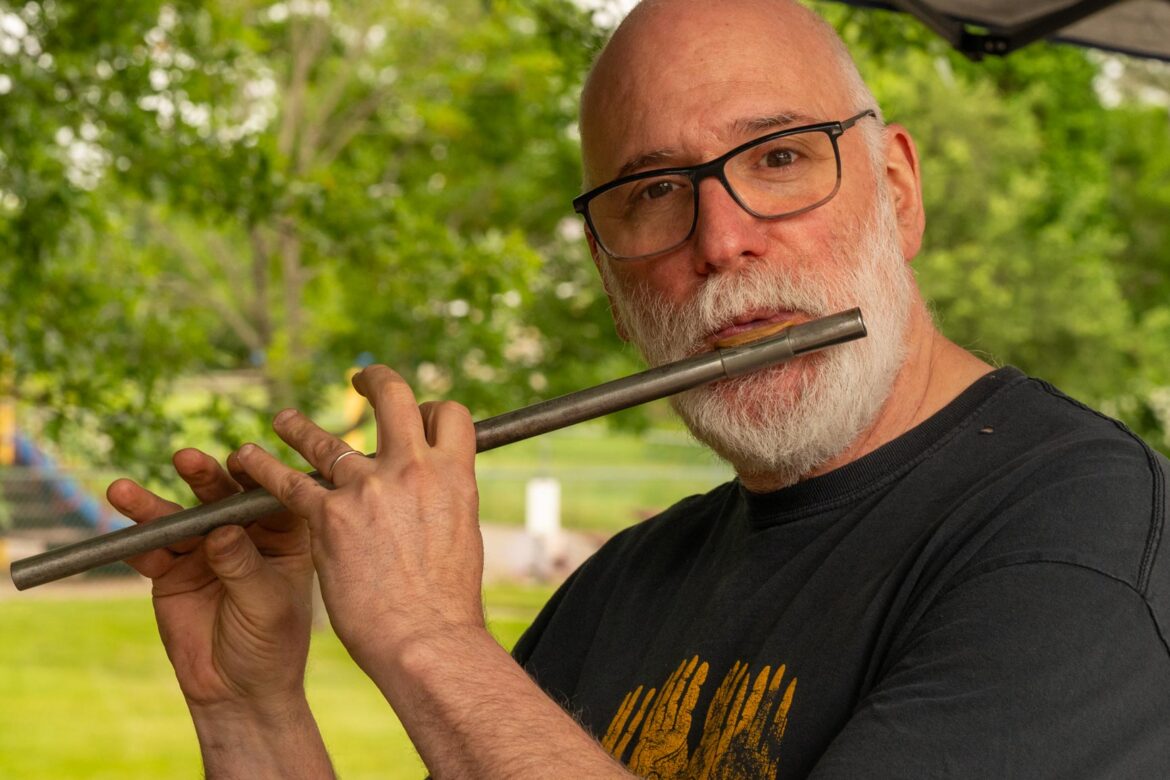
By Arnie Alpert, Active with the Activists

Arnie Alpert spent decades as a community organizer/educator in NH movements for social justice and peace. Officially retired since 2020, he keeps his hands (and feet) in the activist world while writing about past and present social movements.
CONCORD—Ingrid Halverson’s late husband’s shotgun and rifles weren’t doing her any good. For that matter, “They weren’t doing anybody any good,” the Washington, NH, resident said through the window of her car, parked in back of Wesley United Methodist Church in Concord Saturday morning.
“I thought, well, I didn’t want to sell them and put them back in the market. They probably aren’t usable, but I don’t know that.”
Halverson heard about a project that accepts unwanted firearms and converts them into tools, jewelry, bowls, musical instruments, and other useful objects. Halverson checked with her kids, “and they said, go for it. So I did.”
When she pulled up at the church, a volunteer escort met her and asked her to remain in her car while another volunteer, a former police officer, removed the firearms from the car and made sure they weren’t loaded. Each gun’s make, model, and serial number was logged. Their next stop was the “grinding tent,” where another volunteer cut them up to make them inoperable, their parts tossed into a box outside the tent, while Halverson watched from her car.
It was the second New Hampshire Guns to Gardens event, organized by Gunsense NH, itself a project of Granite State Progress. There aren’t many ways to get an unwanted firearm out of circulation, according to Zandra Rice-Hawkins, the group’s director. “If you bring it to the police station, if they’ll even take it, they actually by law have to use it in their own operations or sell it at a public auction.”
“There are a lot of people coming to the realization that firearms in your home don’t necessarily make you safer,” she said, and Guns to Gardens offers a solution.
The people who come have different reasons, Rice-Hawkins said. New parents might not want firearms in a home with young children. Families who know one of their loved ones is dealing with mental illness might want to keep weapons out of their reach. Or, perhaps, she said, “they see what’s happening on the news, the amount of gun violence in our country, and they just don’t want these weapons in their home anymore.”

Debra Altschiller, who as a State Senator has been a strong advocate for measures to reduce gun violence, drove over from the Seacoast for the event, arriving in time to watch someone turn in an AR-15 rifle with its case. “He parked and he actually filmed the destruction of this AR-15, cut into four different pieces. It was really moving knowing that that was the gun that tore up Sandy Hook and Parkland and a number of other places,” she said.
Rice-Hawkins said she watched observers come to tears watching the guns being taken out of commission.
Doug Finkel, a craftsman from Keene, was one of the volunteers in the grinding tent. He’s been collecting rifle barrels, which he converts into flutes. “The idea of making musical instruments from guns is celebratory,” he said.
For Rice-Hawkins, the event is also a relief from the frustrations of her work at the State House, where the combined influence of firearms makers, dealers, and owners is difficult to overcome. Guns to Gardens was uplifting, she said, because even a single firearm turned into a hoe or a pair of earrings makes a difference, especially to survivors of gun violence.
“What we really need now is for the political will to catch up with the public,” which she says overwhelmingly favors closing background check loopholes. Other measures, like waiting periods for gun purchases or extreme risk protection orders, which enable weapons to be taken away from people at serious risk of harming themselves or others, are also popular with voters, she believes.
It’s not just legislators getting in the way, Rice-Hawkins said. New Hampshire’s Attorney General, John Formella, has sided with other Republican AGs to oppose the Biden Administration’s new rules regulating private gun sales. He’s also sided with major firearms manufacturers being sued by the government of Mexico, which claims they are willfully marketing their products to criminals in a country plagued by firearms-related homicides.
As Rice-Hawkins said, changing gun laws is an uphill struggle, or maybe an up-mountain one. But events like Guns to Gardens are part of what New Hampshire grassroots groups are doing, she said, “working together, day in and day out, to advance common sense public safety laws in New Hampshire, and make sure we get to the point where gun violence is not on our nightly news.”
By 1 PM on Saturday, 17 firearms had been turned in and chopped into pieces. Gunsense is planning another Guns to Gardens event in Durham in the fall. And watch for an online auction, where you can bid on wooden bowls, jewelry, and garden tools made from gun parts. The prophet Isaiah would be proud his words are being heeded at last.





